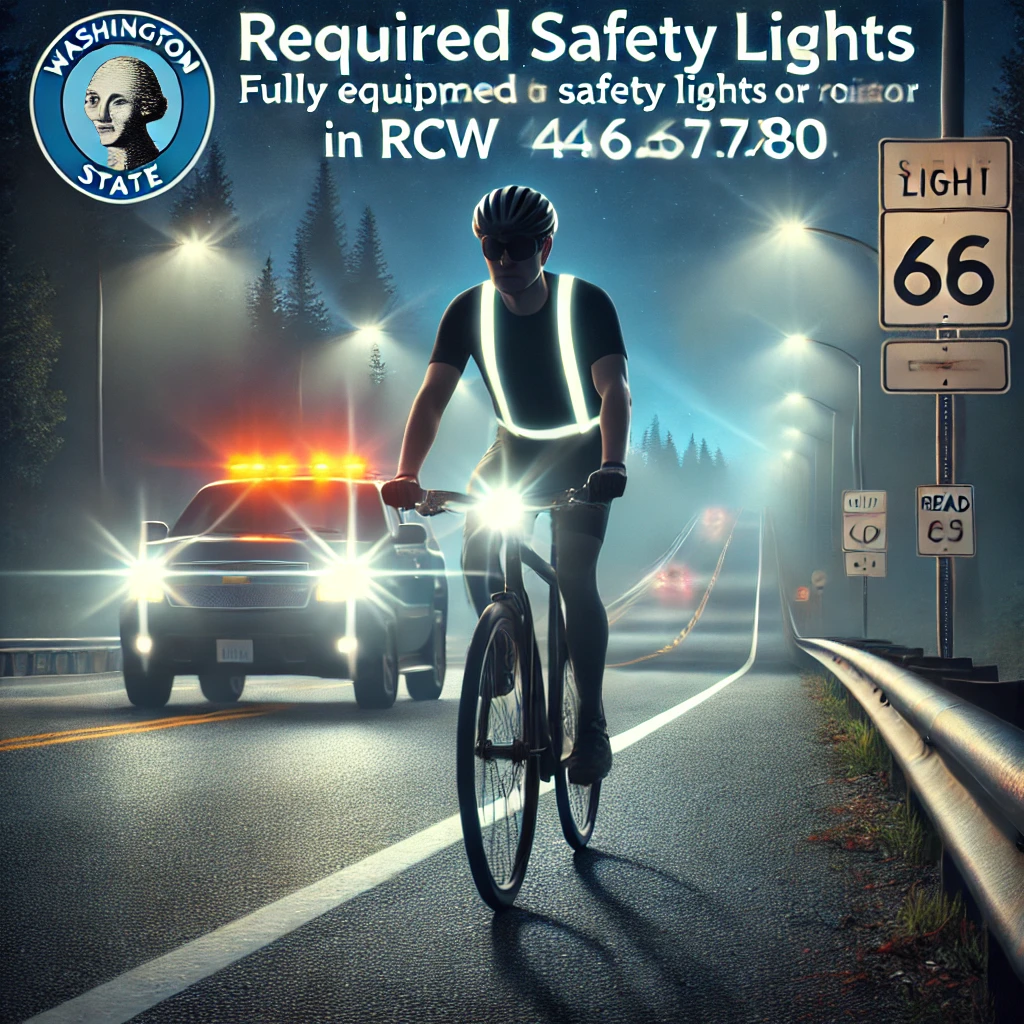ntroduction: RCW 46.61.780 outlines the essential equipment requirements for bicycles operated on public roadways in Washington State. This statute ensures that bicycles are properly equipped for safe riding, particularly during nighttime or low-visibility conditions. In this article, we’ll explore the key provisions of RCW 46.61.780, explaining what every cyclist needs to know to comply with the law and stay safe on the road.
Key Provisions of RCW 46.61.780:
- Required Lighting for Nighttime Riding:
According to RCW 46.61.780, any bicycle operated during the hours of darkness must be equipped with specific lighting. This includes a white light visible from at least 500 feet to the front and a red reflector or a red light visible from 600 feet to the rear. These requirements are designed to ensure that cyclists are clearly visible to other road users, significantly reducing the risk of accidents during nighttime riding. - Additional Reflective Equipment:
In addition to the front and rear lights, cyclists are encouraged to use additional reflective materials on their bicycles or clothing. While not explicitly required by RCW 46.61.780, such materials can further enhance visibility, especially in low-light conditions, providing an extra layer of safety. - Other Equipment Requirements:
The statute also emphasizes the importance of well-maintained brakes. Every bicycle must be equipped with brakes that can make the wheels skid on dry, level, clean pavement. This requirement ensures that bicycles can be safely and effectively brought to a stop, preventing accidents caused by faulty or inadequate braking systems.
Why Compliance Matters: Compliance with RCW 46.61.780 is crucial for the safety of both cyclists and other road users. Proper lighting and braking equipment are vital for preventing accidents, especially in low-visibility conditions. Cyclists who adhere to these regulations can ride with confidence, knowing they are doing their part to stay safe and avoid potential legal issues.
For a complete understanding of the statute, you can review the full text of RCW 46.61.780 here.
Conclusion: RCW 46.61.780 sets forth essential equipment standards for bicycles in Washington State, focusing on safety during nighttime and low-visibility conditions. By ensuring your bicycle meets these requirements, you contribute to a safer road environment for everyone.
Additional Resources
For more insights into Washington State laws and safety practices for cyclists and drivers, check out these articles:
- Understanding RCW 46.61.760: Safe Riding Practices for Bicyclists in Washington State
- Learn about the legal expectations for safe cycling in Washington, including guidelines for staying on designated paths and the responsibilities of cyclists to ensure their own safety and that of others.
- Understanding RCW 46.61.750: Regulations and Penalties for Bicyclists in Washington State
- Explore the specific regulations governing bicyclists in Washington and the penalties for violating these rules, helping riders stay compliant with state law.
- Understanding RCW 46.61.755: Traffic Laws for Cyclists in Washington State
- A comprehensive overview of traffic laws that apply to cyclists, ensuring they understand their rights and obligations when sharing the road with vehicles.
- Three Injured in Car Accident on Highway 20: A Stark Reminder of Road Safety
- A sobering reminder of the importance of road safety, this article examines a recent car accident and its implications for cyclists and drivers alike.
- Understanding RCW 46.61.758: Proper Hand Signals for Cyclists in Washington State
- This guide details the hand signals cyclists are required to use in Washington, promoting safer interactions between cyclists and motorists on the road.
Additionally, explore our client resources here for more details on how we handle similar cases.
About Blanford Law:
At Blanford Law, we are committed to providing relentless, fair, and honest legal representation. With over 20 years of experience, Ken Blanford founded our firm on the belief that every client deserves respect and the best possible defense, free from assumptions or preconceived notions. If you or someone you know is facing criminal charges or has been injured due to someone else’s negligence, please contact us anytime at 253-720-9304 or email us at info@blanfordlaw.com.

